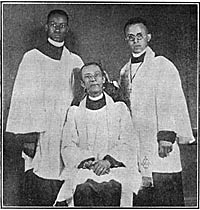Readings:
Psalm 143:5-10
Wisdom of Solomon 10:9-17
2 Corinthians 10:3-7
Luke 17:20-31Preface of Baptism
[Common of a Pastor]
[Common of a Prophetic Witness]
[For the Ministry]
[For Prophetic Witness in the Church]
PRAYER (traditional language)
O God, whose mighty hand freed thy servant George Freeman Bragg from bondage and blessed him with perseverance and courage: Deliver thy Church from its ignorance and injustice, that through his example and prayers all the baptized may share in the work of ministry and, at the last, attain to the perfect freedom of thy Son, our Lord Jesus Christ; who liveth and reigneth with thee and the Holy Spirit, one God, now and for ever. Amen.
PRAYER (contemporary language)
O God, whose mighty hand freed your servant George Freeman Bragg from bondage and blessed him with perseverance and courage: Deliver your Church from its ignorance and injustice, that through his example and prayers all the baptized may share in the work of ministry and, at the last, attain to the perfect freedom of your Son, our Lord Jesus Christ; who lives and reigns with you and the Holy Spirit, one God, now and for ever. Amen.
This commemoration appears in A Grest Cloud of Witnesses.
Return to Lectionary Home Page
Webmaster: Charles Wohlers
Last updated: 1 June 2019
GEORGE FREEMAN BRAGG, Jr.
PRIEST, 1940
 George Freeman Bragg (January 25, 1863 – March 12, 1940) was an African-American priest, journalist, social activist and historian. The twelfth African American ordained as a priest in the Episcopal Church of the United States, he worked against racial discrimination and for interracial harmony, both within and outside of his church.
George Freeman Bragg (January 25, 1863 – March 12, 1940) was an African-American priest, journalist, social activist and historian. The twelfth African American ordained as a priest in the Episcopal Church of the United States, he worked against racial discrimination and for interracial harmony, both within and outside of his church.
Bragg was born into slavery in Warrenton, North Carolina, in 1863, during the American Civil War, and baptised at Emmanuel Episcopal Church. As the war ended, his carpenter father (also George Freeman Bragg) and seamstress mother (Mary) moved their family to Petersburg, Virginia to live with his grandmother Caroline Wiley Cain Bragg, a devout Episcopalian and former slave of an Episcopal priest.
On September 20, 1887, Bragg married the daughter of another prominent Petersburg black family, Nellie Hill. The couple ultimately had two sons and two daughters.
As a child young Bragg delivered newspapers and established relationships with the city's white leaders.
Six months after Bragg began his theological studies at the Bishop Payne Divinity School, he was expelled for "insufficient humility". Bragg then turned his attention to politics, and was appointed a page in the House of Delegates in Richmond in 1881-82. On July 1, 1882, Bragg founded the weekly Petersburg Lancet, dedicated to civil rights issues. In February 1886, he changed the paper's name to the Afro-American Churchman and later it became The Church Advocate. A change in the rector at St. Stephens, Petersburg, also allowed Bragg to resume his theological studies, and he graduated in 1886.
Bragg was ordained a deacon on January 12, 1887, and assigned as vicar to Holy Innocents Episcopal Church, a mission in Norfolk. He successfully challenged a rule that black deacons wait at least five years before ordination as priests.Thus, on December 19, 1888, Bishop Francis McNeece Whittle ordained Bragg as a priest at Saint Luke's Episcopal Church in Norfolk; thus Bragg became the twelfth black Episcopal priest. During next five years, Bragg expanded his congregation into the fully self-supporting Grace Episcopal Church.
In 1891, Bragg accepted a call and became rector of the oldest black Episcopal congregation in the South, Baltimore's St. James Episcopal Church (founded 1824), where he served for 49 years, until his death. Under Bragg's leadership, the struggling congregation of 63 again became self-supporting, tripling in size and building a new structure on Park Avenue and Preston Streets by 1901. By 1924, it was among the largest black Episcopal parishes in the country, with over 500 parishioners.
Bragg continued his social activism fighting racism and Jim Crow laws, both within and outside the church. In 1902 he helped Booker T. Washington found the Committee of Twelve, which fought to prevent disenfranchisement of blacks in Maryland. He also advocated the hiring of African-American teachers to educate African-American children in Baltimore's schools. Bragg later joined W. E. B. DuBois as one of the founders of the Niagara Movement, a precursor of the National Association for the Advancement of Colored People. Bragg also continued publishing the monthly Church Advocate, wrote several books, and worked to develop black ministers, fostering more than 20 vocations.
Bragg fought against restricting the church's mission work to overseas activities, arguing that the denomination also needed to foster African American congregations. He served as secretary and historiographer of the Conference of Church Workers among Colored People—which lobbied, among other things, for the election and consecration of black bishops. Bragg himself was twice interviewed, but never selected for that promotion.
Bragg died on March 12, 1940, after a short hospitalization at Baltimore's Providence Hospital. The Baltimore Sun eulogized his quiet manner, dignity and work for interracial harmony.
more at Wikipedia
More information on Rev. Bragg may be found in the Episcopal Archives. He is the author of History of the Afro-American Group of the Episcopal Church.